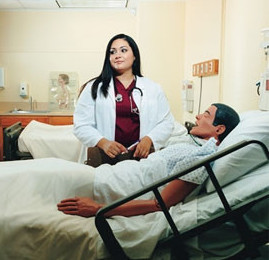One of my readers sent me a nice email and told me how they planned on become a traveling nurse practitioner this year once they start semi-retirement. For those unfamiliar with the concept, semi-retirement means that you work just enough to cover your expenses minus was you are getting from passive income. In this case, you wouldn’t need to save any of your income. There is no need to make more than your expenses because you have saved enough in retirement accounts etc., and just need more time for compound interest to grow your net worth.
For instance, someone may have $1000 a month coming from their real estate rental income. They need $2000 per month to cover all of their expenses. Therefore, they only need to work enough shifts per month to cover the remaining $1000/month for their expenses.
After she mentioned this to me, I reflected to see if this would be a good option for me as well – instead of just completely retiring early. I think it would be quite difficult to give up my identity as a nurse practitioner. If I went years without practicing I would lose my skills and wouldn’t be able to return to work competently.
I still like the medical aspect of my job – figuring out what patients have and providing appropriate treatment – such as a puzzle. I like the teaching aspect too. I enjoy forming relationships with patients and seeing their health improve. Of course, there are some aspects of the job I wouldn’t miss such as demanding patients, or being overwhelmed by scheduling. It’s amazing how we can often let one rude patient ruin our day after having 20 other nice patients.
If I were to semi-retire, I could work a mere 3-6 months to cover my expenses. This would be great because I would still have at least 6 months to travel or do whatever it is I wanted. Plus, I would continue to have a sense of purpose through working and could allow my portfolio to compound even more.
When I take off an extended amount of time from work, I always go back refreshed and am even excited to see patients. If I worked 3 months on and 3 months off, my passion for medicine would continue to thrive.
There is also an option for me to work part-time. In some cases, a part-time job would provide necessary benefits such as health insurance. Once I’ve had enough of travel, this may be a good choice for later on. I just have to make sure I won’t be working “full-time hours” with part-time pay.
Outside of clinic practice, I can potentially work in teaching. I have previously taught at both the RN and NP level when I was living in Miami, and really enjoyed it. I may even consider going back to school for my PhD. I know various Universities that provide free tuition in getting a PhD while working as a teaching assistant for them.
By working less than full-time, I would have the time and energy to become more involved in nurse practitioner advocacy through local and state organizations. I would also have the opportunity to volunteer and continue to mentor youth, which has always been one of my passions.
Anyways, the possibilities are endless and that’s always exciting! Have you thought about what you will be doing when you choose to semi-retire, retire, or just want to change positions?
Like this:
Like Loading...











